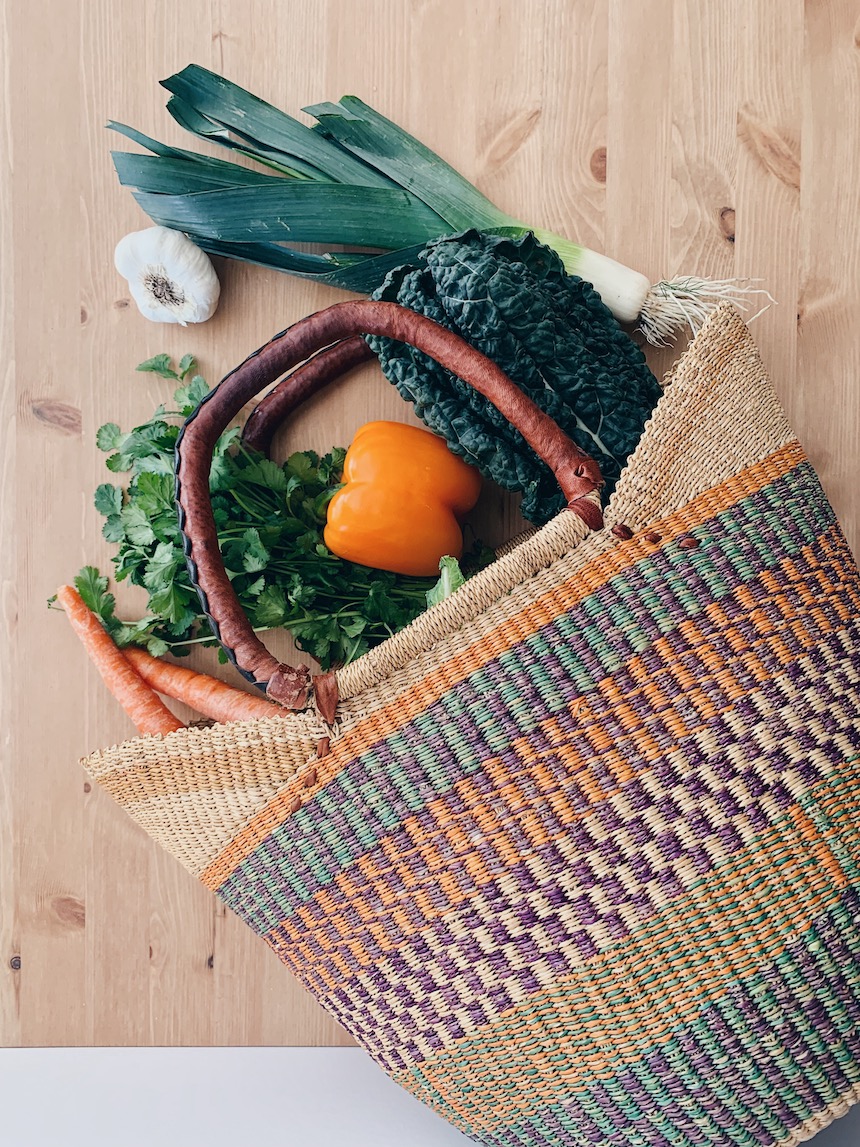How To Be More Eco-Friendly While Buying Groceries

Unless you live in California, there seem to be a plethora of plastic bags everywhere you look. A lot of people are on board with minimizing waste, and that’s a step in the right direction. However, grocery stores don’t make it easy. It can be a balancing act when it comes to staying within your budget, eating high-quality food, and trying to be conscious of waste.
It’s especially frustrating when you’re trying to eat healthier and you go to buy vegetables, only to see them wrapped in plastic.
I know it can get overwhelming, but even if you implement just one of the tips below, it’s a great stepping stone. From there, you can slowly add another and then another, and so on. It’s not about being perfect all of the time, but knowing that every step counts.
Below I’ve broken it down by section and how to be more eco-friendly in each grocery department.
How To Be More Eco-Friendly While Buying Groceries
produce section
You know those plastic bags that are scattered all throughout the produce section? There’s no need to put your produce in those bags. You can just put your produce directly in your cart. You’re going to wash it before you consume it anyway, so there’s really no point in the plastic bag.
If you’re buying something like loose spinach leaves or leafy greens and you need a bag, or you’re buying a large number of onions or potatoes for example and it’s easier to have them all together, I recommend using a reusable produce bag.
They’re free of plastic, affordable, and of high quality.

pre-cut fruit and veggies
Sure, pre-cut produce will save you a little time, but it’s typically more expensive than if you were to just buy the whole fruit or vegetable and cut it up yourself. Not to mention, anything pre-cut or made ahead of time generally comes in a plastic container.
Buying precut produce really won’t save you that much time in the long haul. We can take a couple of extra minutes to cut it ourselves and skip the waste altogether.
packaged food
It would be great if we could all make everything from scratch, but that’s just not the reality for a majority of people.
When buying packaged items, try to buy things in glass jars when possible because then you can recycle the jar – simply by washing it and reusing it for something else whether that’s a pantry item or to store homemade sauces or dressings.
When buying something in a can, look for BPA free, and then make sure you recycle it afterward. If buying something such as packaged snacks, look for recycled packaging instead of items wrapped in single-use plastic.
bulk bin section
The bulk bin can be a great place to shop if your grocery store has one. However, if you’re buying something in the bulk bin and then you automatically put it in one of the plastic bags the store provides, it’s nearly the same thing as buying it from a package.
To reduce waste and be more eco-conscious, you can either use a reusable produce bag. I use these because of the mesh, knowing that nothing is going to slip through OR you could use a nut milk bag*.
If using a produce bag, I suggest using one similar to the one I linked above because, for bulk items, you want to make sure your item isn’t going to slip through the threads.
*If you’re wondering what a nut milk bag is, it’s basically just a small threaded bag to use when making your own nut and seed milk alternatives. It’s how you divide the pulp from the liquid.
meat department
Head to the butcher instead of the refrigerated section. The refrigerated section is full of animal protein wrapped in plastic, but if you make a visit to the butcher, you’ll see that they wrap the meat in a sheet of either wax or parchment paper followed by an outer paper wrapper.
Paper is much easier to recycle than plastic, and it’s often the same price (if not cheaper) to buy directly from the butcher.
salad bar/hot food bar

These aren’t available at all grocery stores, but they’re a great option for on-the-go food.
At stores such as Whole Foods and other organic markets, they usually provide eco-friendly containers that are made of recycled products.
Instead of opting for plastic or recycled silverware, bring your own set of bamboo utensils. You can easily stash them in your bag, purse, or car so you always have them when you’re on the go.
Not only is bringing your own utensils a great way to cut down on unnecessary waste, but they’re also affordable, functional, and they last a long time. My favorite set includes a fork, knife, spoon, and a pair of chopsticks.
bagging groceries
Some organic and natural food stores only provide paper bags or cardboard boxes for bagging groceries. But, too many places still allow plastic bags and give out a plethora of them to each shopper that doesn’t provide their own or speak up for a different option.
Reusable grocery bags are the best option for cutting down on plastic and waste. They offer them at nearly every store, you can find them online, or at farmer’s markets.
They come in a wide variety of styles – wicker, canvas, cooler bags, etc. Some of my favorites are canvas ones that I found at local shops or were gifted to me.
I often hear people at the grocery store saying they forgot their reusable bags at home. To make sure you remember them every time, put them near the door so you always see them on the way out, stash one or two in your car for a just-in-case scenario, or write them on your grocery list, and then put them with your wallet the night before you’re heading to the store.

